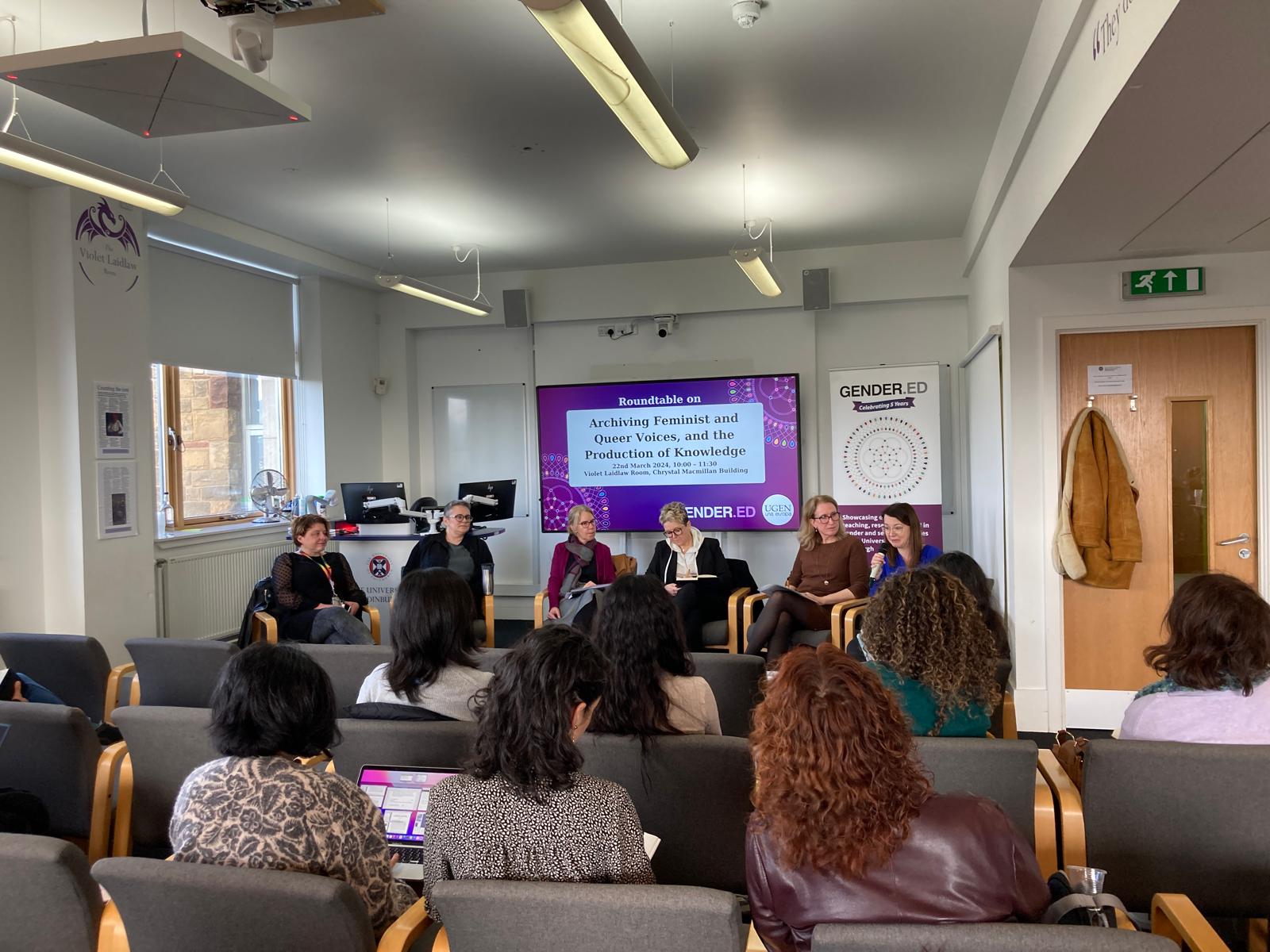Archiving in Uncertain Times
This dossier on Archiving Feminist and Queer Voices, and the Production of Knowledge comprises a series of short posts from speakers at our roundtable on the topic convened during the visit we hosted for members of UGEN at this event.
By Heike Pantelmann

Image: Audience members gathered to listen to the roundtable on archives. Credit: Wannes Dupont.
The Margherita von Brentano Center’s predecessor institution was founded in 1981 as a centre with the main task of promoting gender studies within Freie Universität Berlin. Looking back, it turned out that promoting gender studies also meant archiving a lot of things. I'm not sure the extent to which my former colleagues were aware of this when they started. One of the archival projects we worked with was creating a database with professorships with a designation [for Gender Studies]. So, the name of the professorship, it could be "Social Sciences and Gender Studies" or just "Social Sciences". We have kept track of these professorships since 1990. There is a lot of change, where professorships with speciality designations are set up and we lose them. Initially, this database was meant as a way to showcase the development of the field and to show that we have so many professorships with a speciality designation. Later, when we started receiving backlash, we had to change the way we presented the data, because it was used against us. And so now we have a searchable database that does not present the overall number of designated professorships. It's very interesting that we do not show the development in this database. So, we have the data in our archives, but it's not openly accessible.
Another example of the archival work we have done is creating a course catalogue, which was also started in 1990. It was initially a printed catalogue, then it was printed online, and now it's online only. In the beginning, this course catalogue was called ‘Gender Course Catalogue of Women's Studies,’ and today we call it ‘Gender Diversity Queer Studies’. When we look at the key search words, we can see how the field has changed. We are very interested in knowing what the topics are and how those have changed to shape the field. Who is teaching the courses? Is the number of courses related to professorships with designation [for Gender Studies], or is it more young researchers, who are interested in promoting these topics? In which disciplines are gender studies represented, and how does this change over time? We also have to consider that with the very difficult history of limited contracts and universities in Germany; with this we are losing a lot of memory and a lot of knowledge and have to consider that organisations do not learn or do not keep memories. So, we have to kind of trace and keep the memories that organisations don’t. And as I said, our centre was founded in 1981, and I can tell you that many colleagues at my university don't even know we exist.
I want also to talk about the field of gender equality in Germany, the women's studies and gender equality fields divided in the early ‘90s, I would say. When it comes to gender equality, I think that it is also very different and very difficult to document what happened because it's always supposed to be a success story, especially after 2006, when in Germany there was the Excellence Initiative, and suddenly all the universities that were judged by external international reviewers and became aware of gender: “oh wait, gender equality policies, that's something important.” And so, what changed in the field is the gender equality actors. They only document their success and not the failure, and I think that's a difficult thing.
I also want to address one topic related to research communication. We have a Gender Studies Day— it's December 18th— it was established in 2017 because the backlash against Gender Studies was so bad that we wanted to show all the good research that exists and the interesting topics that we had researched. And it was at the time mainly something that was done on Twitter. So, under the hashtag 4 Gender Studies (#4GenderStudies), we were promoting our field. We were telling stories about the research. And then we as a centre, we were always documenting and analysing the Twitter activities around December 18th. And then something happened we were not prepared for; Elon Musk took over and Twitter died. I mean it's now X but it's not the same and suddenly we cannot document the activities around December 18th on Twitter because they are taken away from Twitter. They are taking place offline on different channels. And this is very interesting when you look at the wish to archive things and you start in a certain way and then there is a break, and you have to adapt and go further.
Author Bio
Dr. Heike Pantelmann is Managing Director of the Margherita von Brentano Center for Gender Studies at Freie Universität Berlin. She holds a doctorate in business administration. Her research interests lie in the following topics: sexual harassment in higher education contexts; gender order/gender relations, power and control in organizations. Other fields of work are gender and diversity in teaching and internationalization of Gender Studies.